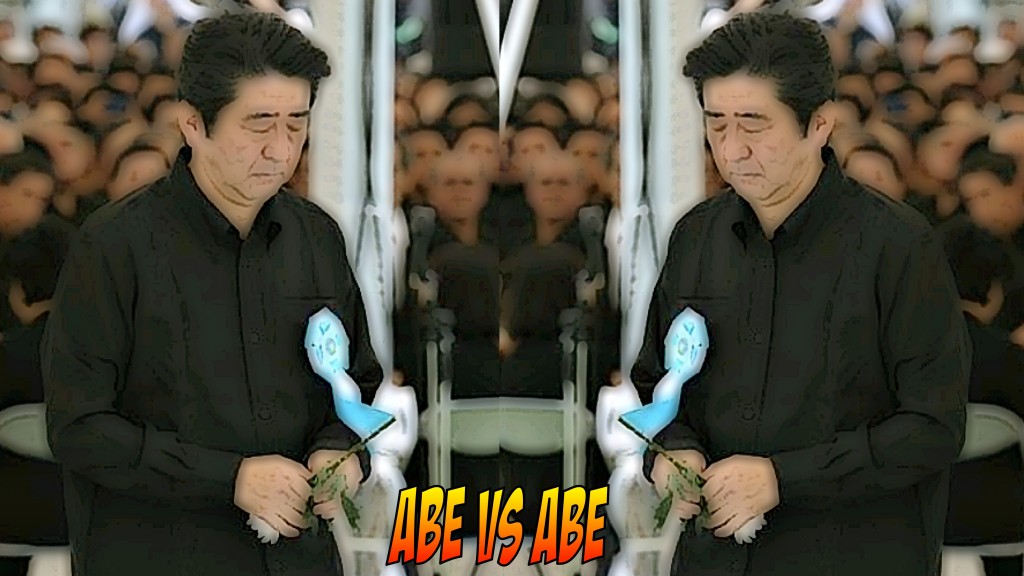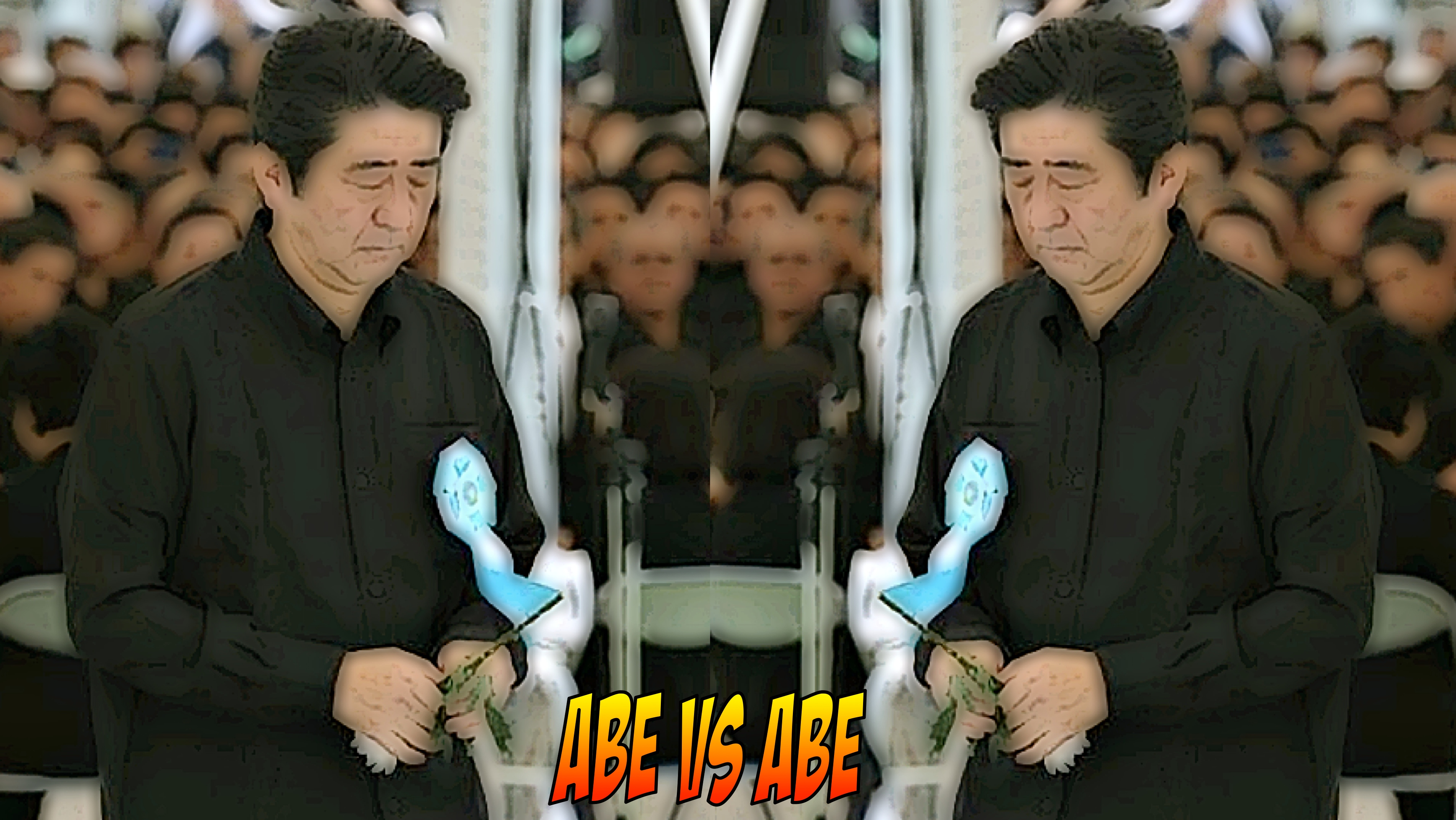If you felt a sense of déjà vu when listening to Prime Minister Shinzo Abe give a speech at the ceremony commemorating the 69th anniversary of the Hiroshima nuclear bombing on August 6th, you’re not alone. Parts of Abe’s speech are nearly identical to the one he gave last year, the most notable different being that he changed “68 years ago” to “69 years ago.” I decided to take a page out of Abe’s book and copy and paste his speeches. Paragraphs that are similar to each other have been made bold below. Both speeches were taken from the Prime Minister’s cabinet website. Although the middle of both speeches differ from each other, the second to last paragraph of this year’s speech, in which Abe gives his condolences to those who suffer from nuclear radiation-related diseases and calls for the abolition of nuclear weapons, in particular is only a rewording of at the same idea conveyed in last year’s speech.
Editor note: There is indeed, as Ecclesiastes once noted, nothing new under the (land of the rising) sun

平成25年8月6日
広島市原爆死没者慰霊式並びに平和祈念式あいさつ
広島市原爆死没者慰霊式、平和祈念式に臨み、原子爆弾の犠牲となった方々の御霊に対し、謹んで、哀悼の誠を捧げます。今なお被爆の後遺症に苦しんでおられる皆様に、心から、お見舞いを申し上げます。
68年前の朝、一発の爆弾が、十数万になんなんとする、貴い命を奪いました。7万戸の建物を壊し、一面を、業火と爆風に浚わせ、廃墟と化しました。生き長らえた人々に、病と障害の、また生活上の、言い知れぬ苦難を強いました。
犠牲と言うべくして、あまりに夥しい犠牲でありました。しかし、戦後の日本を築いた先人たちは、広島に斃れた人々を忘れてはならじと、心に深く刻めばこそ、我々に、平和と、繁栄の、祖国を作り、与えてくれたのです。蝉しぐれが今もしじまを破る、緑豊かな広島の街路に、私たちは、その最も美しい達成を見出さずにはいられません。
私たち日本人は、唯一の、戦争被爆国民であります。そのような者として、我々には、確実に、核兵器のない世界を実現していく責務があります。その非道を、後の世に、また世界に、伝え続ける務めがあります。
昨年、我が国が国連総会に提出した核軍縮決議は、米国並びに英国を含む、史上最多の99カ国を共同提案国として巻き込み、圧倒的な賛成多数で採択されました。
本年、若い世代の方々を、核廃絶の特使とする制度を始めました。来年は、我が国が一貫して主導する非核兵器国の集まり、「軍縮・不拡散イニシアティブ」の外相会合を、ここ広島で開きます。
今なお苦痛を忍びつつ、原爆症の認定を待つ方々に、一日でも早くその認定が下りるよう、最善を尽くします。被爆された方々の声に耳を傾け、より良い援護策を進めていくため、有識者や被爆された方々の代表を含む関係者の方々に議論を急いで頂いています。
広島の御霊を悼む朝、私は、これら責務に、旧倍の努力を傾けていくことをお誓いします。
結びに、いま一度、犠牲になった方々の御冥福を、心よりお祈りします。ご遺族と、ご存命の被爆者の皆様には、幸多からんことを祈念します。核兵器の惨禍が再現されることのないよう、非核三原則を堅持しつつ、核兵器廃絶に、また、恒久平和の実現に、力を惜しまぬことをお誓いし、私のご挨拶といたします。
平成二十五年八月六日 内閣総理大臣・安倍晋三
平成26年8月6日
広島市原爆死没者慰霊式並びに平和祈念式あいさつ
広島市原爆死没者慰霊式、平和祈念式に臨み、原子爆弾の犠牲となった方々の御霊に対し、謹んで、哀悼の誠を捧げます。今なお被爆の後遺症に苦しんでおられる皆様に、心から、お見舞いを申し上げます。
69年前の朝、一発の爆弾が、十数万になんなんとする、貴い命を奪いました。7万戸の建物を壊し、一面を、業火と爆風に浚わせ、廃墟と化しました。生き長らえた人々に、病と障害の、また生活上の、言い知れぬ苦難を強いました。
犠牲と言うべくして、あまりに夥しい犠牲でありました。しかし、戦後の日本を築いた先人たちは、広島に斃れた人々を忘れてはならじと、心に深く刻めばこそ、我々に、平和と、繁栄の、祖国を作り、与えてくれたのです。緑豊かな広島の街路に、私たちは、その最も美しい達成を見出さずにはいられません。
人類史上唯一の戦争被爆国として、核兵器の惨禍を体験した我が国には、確実に、「核兵器のない世界」を実現していく責務があります。その非道を、後の世に、また世界に、伝え続ける務めがあります。
私は、昨年、国連総会の「核軍縮ハイレベル会合」において、「核兵器のない世界」に向けての決意を表明しました。我が国が提出した核軍縮決議は、初めて100を超える共同提案国を得て、圧倒的な賛成多数で採択されました。包括的核実験禁止条約の早期発効に向け、関係国の首脳に直接、条約の批准を働きかけるなど、現実的、実践的な核軍縮を進めています。
本年4月には、「軍縮・不拡散イニシアティブ」の外相会合を、ここ広島で開催し、被爆地から我々の思いを力強く発信いたしました。来年は、被爆から70年目という節目の年であり、5年に一度の核兵器不拡散条約(NPT)運用検討会議が開催されます。「核兵器のない世界」を実現するための取組をさらに前へ進めてまいります。
今なお被爆による苦痛に耐え、原爆症の認定を待つ方々がおられます。昨年末には、3年に及ぶ関係者の方々のご議論を踏まえ、認定基準の見直しを行いました。多くの方々に一日でも早く認定が下りるよう、今後とも誠心誠意努力してまいります。
広島の御霊を悼む朝、私は、これら責務に、倍旧の努力を傾けていくことをお誓いいたします。結びに、いま一度、犠牲になった方々のご冥福を、心よりお祈りします。ご遺族と、ご存命の被爆者の皆様には、幸多からんことを祈念します。核兵器の惨禍が再現されることのないよう、非核三原則を堅持しつつ、核兵器廃絶に、また、世界恒久平和の実現に、力を惜しまぬことをお誓いし、私のご挨拶といたします。平成二十六年八月六日
内閣総理大臣・安倍晋三
For those who cannot read Japanese, you can take a look at the English translations of the speeches, which are also similar to each other. The italics are parts of his speech that are almost the same as the year before.
Address by Prime Minister Abe at the Hiroshima Peace Memorial Ceremony
Wednesday August 6, 2014
Here today, on the occasion of the Hiroshima Peace Memorial Ceremony, I reverently express my sincere condolences to the souls of the atomic bomb victims. I also extend my heartfelt sympathy to those still suffering from the aftereffects of the atomic bomb.
On this very morning 69 years ago, a single bomb deprived well more than 100,000 people of their precious lives. It destroyed some 70,000 buildings and swept away the entire area through its hellish fires and its blast, turning the area to ruins. Those who survived were forced to endure unspeakable hardships of illness and disability and tribulations in their daily lives.
The enormous price that was paid should be regarded as an immense sacrifice. However, our forebears who built post-World War II Japan had etched deeply upon their hearts that they must never forget the people who perished in Hiroshima. It was in this spirit that they created, and then bequeathed to us, a homeland of peace and prosperity. We cannot help but find the most beautiful form of achievement in the streets of Hiroshima, full of greenery, where the continuous chirping of cicadas breaks the silence even now.
As the only country in human history to have experienced the horror of nuclear devastation in war, Japan bears a responsibility to bring about “a world free of nuclear weapons” without fail. We have a duty to continue to convey to the next generation, and indeed to the world, the inhumanity of nuclear weapons.
Last year at the High-Level Meeting of the United Nations General Assembly on Nuclear Disarmament, I declared my determination to achieve “a world free of nuclear weapons.” The draft resolution on nuclear disarmament submitted by the Government of Japan had more than 100 co-sponsor states for the first time and was adopted by an overwhelming majority. Working towards the early entry into force of the Comprehensive Nuclear-Test-Ban Treaty, Japan is also advancing realistic and practical nuclear disarmament by directly urging the heads of state and government of relevant nations to ratify the Treaty and through other such efforts.
In April this year, the Non-Proliferation and Disarmament Initiative Ministerial Meeting among foreign ministers was held here in Hiroshima. From this site of an atomic bombing, our thoughts were sent out powerfully to the world. Next year will be the milestone year of the 70th year since the bombing, and the Review Conference of the Parties to the Treaty on the Non-Proliferation of Nuclear Weapons, which is held once every five years, will also be convened. We will advance our efforts to realize “a world free of nuclear weapons” still further.
There are individuals who are still now enduring pain and suffering caused by the atomic bombing and waiting to be recognized as having an atomic bomb disease. At the end of last year, the Government conducted a review of the criteria for granting recognition, bearing in mind the discussions held by relevant persons over three years. The Government will continue to make good-faith efforts to enable a large number of people to receive such recognition as soon as possible.
This morning, as we mourn the souls of the victims in Hiroshima, I pledge that I will redouble my efforts to carry out these duties. I would like to conclude with my heartfelt prayers once more for the repose of the souls of the victims. I would also like to extend my best wishes to the bereaved families and to the atomic bomb survivors. I will close my address with a pledge that Japan will firmly uphold the “Three Non-Nuclear Principles” and spare no efforts in working towards the total abolition of nuclear weapons and the realization of eternal world peace, so that the horror and devastation caused by nuclear weapons are not repeated.
Shinzo Abe
Prime Minister of Japan
August 6, 2014
This isn’t the first time Abe has recycled speeches. Users online have remarked that Abe also used the same phrases at a memorial service for dead soldiers in Okinawa two years in a row.
With a long succession of prime ministers who rarely last more than a year, perhaps Abe didn’t expect to be in office for so long and didn’t think of setting the time aside to prepare something more original. More likely, he was being lazy.
****
Editor note 1: Maybe he just hates 1) remembering Japan lost the war 2) Japan might have won the war if they’d built their atomic bomb earlier 3) He thinks this whole Hiroshima thing is a pain in the ass because it really reminds people of how dangerous and destructive nuclear power is and that the Fukushima meltdown mess is an ongoing disaster. This isn’t helping him and his pals at TEPCO or his LDP cronies with a lot of TEPCO and KEPCO stock.
Editor note 2: I’m not entirely unsympathetic to the man. After writing about the yakuza for 20 years, I run out of ways to discuss them without some repetition–but then again, I’m not expressing my ‘heartfelt’ sympathy to them or their victims either.

machine a sous 24 columbus
Prime Minister Shinzo Abe plagiarizes himself: If you can recycle nuclear fuel, why not speeches? : Japan Subculture Research Center